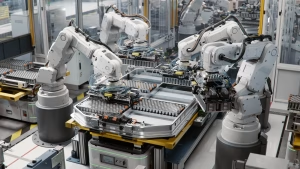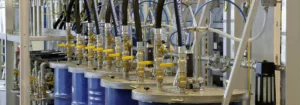Updated: Oct 7, 2025
The chemical and pharmaceutical industries are hallmarked by stringent safety regulations, meticulous precision demands, Powering Safety, Precision, and Efficiency with Air Motors
In the chemical and pharmaceutical industries, every piece of equipment must meet the highest standards of safety, reliability, and performance. From hazardous production environments to sterile manufacturing areas, operators depend on tools that deliver consistent results without compromising compliance.
That’s where air motors, also known as pneumatic motors, excel. These robust, spark-free power sources have become indispensable for mixing, pumping, and material handling in chemical plants and pharmaceutical facilities around the world.
Why Air Motors Are Ideal for Chemical and Pharmaceutical Applications
1. Intrinsic Safety for Hazardous Environments
Air motors operate using compressed air instead of electricity, eliminating the risk of sparks or overheating. This makes them the preferred choice for explosive or flammable atmospheres, such as chemical processing areas or solvent-handling zones.
- No ignition risk with volatile materials
- Safe for ATEX-certified environments
- Perfect for flammable powders and gases
2. Exceptional Durability and Reliability
Designed with few moving parts and corrosion-resistant materials, air motors thrive in demanding conditions. They withstand chemical exposure, dust, and moisture, ensuring long service life with minimal maintenance.
- Stainless steel options available for cleanroom or corrosive environments
- Resistant to dust, humidity, and aggressive cleaning agents
- Ideal for pharmaceutical-grade hygiene standards
3. Precision Control for Process Optimization
Air motors allow precise adjustment of speed and torque through air pressure regulation. This enables operators to fine-tune mixing speeds, blending intensity, or pump flow rates for each application.
- Variable speed control for delicate formulations
- Smooth start and stop functions
- Consistent performance across load variations
Key Applications of Air Motors in the Chemical and Pharmaceutical Industries
🔹 Mixing and Agitation
Air motors are frequently used to power mixers and agitators that blend chemicals, liquids, or active pharmaceutical ingredients (APIs). Their controllable torque and steady rotation help ensure uniform product quality and batch consistency.
🔹 Pumping and Fluid Transfer
In processes involving corrosive, viscous, or flammable liquids, air-operated pumps offer a spark-free and explosion-proof alternative to electric motors. They are also easy to clean and sterilize, supporting GMP (Good Manufacturing Practice) compliance.
🔹 Valve Actuation and Process Control
Air motors deliver reliable power for opening and closing process valves, regulating fluid flow, or driving automated systems. Their responsiveness enhances process safety and accuracy in controlled environments.
🔹 Auxiliary Applications
Beyond these primary uses, air motors drive a variety of secondary equipment, such as:
- Conveyor systems
- Filling machines
- Skimmers and separators in settling tanks
- Portable or handheld tools for maintenance
In every case, air motors combine safety, control, and efficiency, making them a practical and sustainable alternative to traditional electric drives.
Selecting the Right Air Motor for Your Process
Choosing the optimal air motor for your operation depends on several key factors:
| Selection Criteria | What to Consider |
|---|---|
| Power & Torque Requirements | Match the motor output to your process demands—high-viscosity mixing needs higher torque. |
| Speed Range | Define the desired control level—air motors provide infinite speed variability with air pressure adjustment. |
| Material Compatibility | Choose stainless steel for corrosive or sterile environments. |
| Safety Certification | For explosive atmospheres, ensure the motor meets ATEX or IECEx standards. |
By aligning motor specifications with your process needs, you ensure maximum efficiency, operator safety, and long-term reliability.
The Atlas Copco Advantage
With decades of experience in compressed air and pneumatic drive systems, Atlas Copco provides a comprehensive portfolio of air motors engineered for industrial reliability. Each solution is designed to optimize safety, hygiene, and performance in sensitive environments.
- Wide range of ATEX-certified air motors
- Customizable configurations for chemical and pharmaceutical processes
- Global technical support and easy integration into existing systems
Explore the full range of options in our Pocket Guide to Air Motors or contact our experts for personalized guidance.
Further Read
- ATEX Certification for Industrial Motors | Standards, Zones & Compliance
- Where ATEX Is Required | Industrial Motors ATEX Motors Guide
- The impact of counterfeit ATEX-certified electric motors on industry.
- Exploring the Origins of Ex Standards – The ATEX Directive
- Air Motors for Chemical and Pharmaceutical Industries
- Air Motors in Chemical and Pharmaceutical Applications
- What Are ATEX Areas? | Industrial Motors Guide
Conclusion
Air motors play a pivotal role in safe, efficient, and precise operations across the chemical and pharmaceutical industries. Their spark-free design, robust construction, and exceptional controllability make them an ideal choice for any process where reliability and safety are non-negotiable.
By partnering with Atlas Copco, manufacturers can enhance product quality, operational uptime, and compliance—all while maintaining the highest standards of safety and efficiency.


